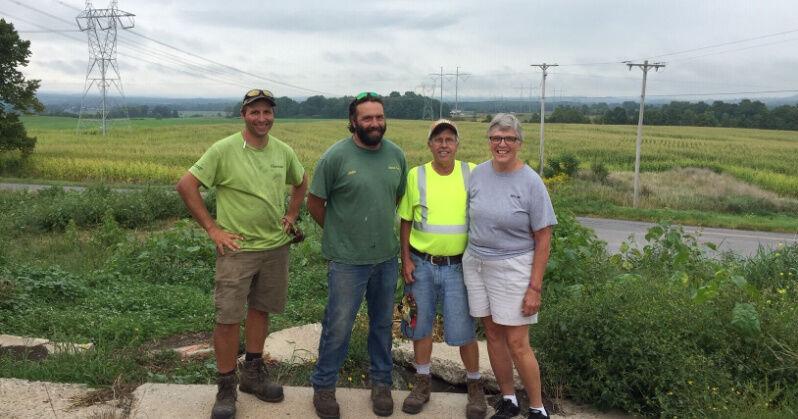
TOWN OF GLEN — A family-owned farm in Glen will safeguard its longevity and ensure the spread remains forever farmland following the completion of a conservation project.
Glenvue Farm owners, Russ and Judy Kelly, worked with Mohawk Hudson Land Conservancy (MHLC) to secure a state Department of Agriculture and Markets grant funding the purchase of development rights for their farmland.
Conservation easements have been secured to protect three properties spanning 866-acres in Glen and Root which make up the family-owned dairy farm. It is the third conservation project completed by MHLC in Montgomery County this year protecting a combined 1,823 acres of farmland.
“We really see value in maintaining open farmland, because not only is it historic to the state of how New York has grown and flourished, it’s also an essential economic driver locally, and farms being open space also serve as a natural climate solution,” said Sarah Walsh, associate director of MHLC, on Thursday.
Glenvue Farm will receive direct funding from the grant through the Farmland Protection Implementation Program Dairy Transition Funding stream, which is designed to support dairy farmers transitioning to the next generation and diversifying their operations.
Started with 290 acres in 1972, Glenvue Farm has grown over the years to nearly 900 acres as the Kelly family secured the land of surrounding farms without younger generations willing and able to continue operations. Glenvue Farm is still growing with Justin and Ryan Kelly poised to take over from their parents.
“The farm will have to continue to grow. It has changed dramatically since my father bought it to where it is now,” said Russ Kelly, who is a member of the Glen Town Board. “We also hope that the funds will allow our sons to acquire more land if they want, improve the facilities, or have options for different forms of agriculture.”
Proceeds from selling the development rights to the farmland will provide a solid base for Justin and Ryan Kelly which they can use to buy more nearby land to support their dairy herd and to continue expanding into other agricultural areas.
Glenvue Farm has already begun branching into using their own compost and manure, which can be sold to other farms for additional income, Walsh said. As they buy more land, she said, they could potentially use it to grow hay for their own herd and to sell.
Diversifying is especially important for dairy farmers, Walsh indicated. Falling dairy prices, closures of processing plants and tightened regulations have stretched and pushed out farmers. The growth of dairy alternatives has created further competition in the market.
“Dairy has taken a huge change in consumer products,” Walsh said. “It’s all about long-term viability for farmers on the landscape.”
In general, Walsh said, the mounting struggles have forced generational farmers to sell their herds and their land. Establishing conservation easements ensures the preservation of prime farmland.
Glenvue Farm will be forever protected from land use change should Russ and Judy Kelly’s sons ever leave farming or their only granddaughter does not choose to farm.
“We didn’t have a lot of development pressure, but now there is tremendous pressure from solar,” Russ Kelly added.
MHLC does not oppose development, Walsh said, but there needs to be a balance between the built environment and the natural environment. Conservation projects help protect wildlife, promote clean air and water, and help preserve the local connection to nature.
“Down the road, people will say I’m glad that area is protected, because I’ve always driven down that road and seen that beautiful hillside or seen cattle grazing,” Walsh said. “People enjoy being able to see the landscape they saw in their childhood remain, and I think that’s really at the heart of the work we do.”
“Soil provides food. Supporting farmers is very important to local economics,” she added.
The process of establishing conservation easements at Glenvue Farm took around four years to complete. MHLC, a nonprofit conservation organization, oversaw the process of writing the grant, securing letters of support, having the land surveyed and assessed, and establishing the easement.
“We work really hard to ensure it isn’t a burden to the farmers. They are making a living working incredibly hard, so my job as the project manager is to be the liaison between the department and the landowner,” Walsh said.
The Kelly family was patient and supportive throughout the process since connecting with MHLC through the Montgomery County Soil and Water Conservation District. Walsh described Russ Kelly as an advocate of conservation in the region, talking to other farmers who might be interested in undertaking similar projects.
“Working with them has been an absolute delight,” Walsh said of the Kelly family. “They are a loving family, who love farming and want to make sure it stays on the landscape and continues to be a New York tradition.”
While the long-term impacts of projects fostered by MHLC remain to be seen, Walsh said a conservation easement established at Indian Ladder Farms in nearby Albany County has helped that site grow and thrive to become an iconic destination for apples, cider and other goods.
“And it will always look like that because of the protections we placed on that land,” Walsh said. “Ensuring these historic landscapes can be part of the next generation is incredibly important.”
Since its founding in 1992, MHLC has protected over 15,000 acres of land. The organization conserves and stewards lands and waters of the Mohawk and Hudson River valleys for people and the environment in Albany, Schenectady, and Montgomery counties.
